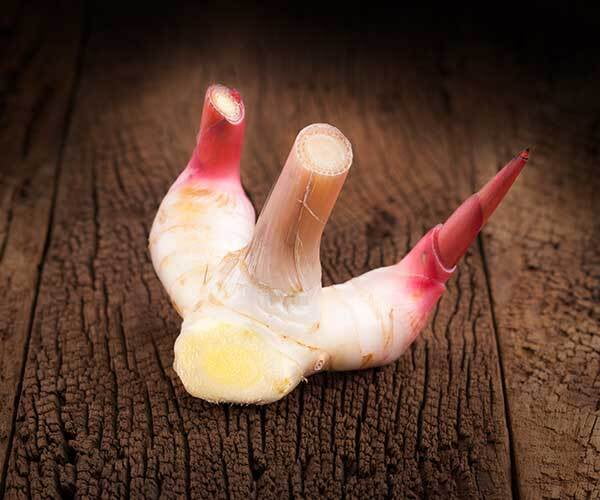My shopping cart
Your cart is currently empty.
Continue Shopping
Thailand's traditional cuisine bears some amazing health benefits such as weight control, boosts to the immune system, and controlling blood pressure. A recent study at a Thailand university found the ingredients used in Tom Yam Kung soup are 100 times more effective in reducing cancerous tumor growth than other foods. Let's have a closer look at the incredible medicinal fresh herbs and spices used in Tom Yum and other Thai dishes that make Thai food one of the healthiest cuisines in the world!

A citrus flavoured herb known to add a zing to many Thai dishes. Lemongrass helps prevent the growth of some bacteria and yeast, a remedy for flus and colds, assists in the relieve of pain and swelling, reduces fever, assists with headaches and stomach conditions.

Galangal is included in many Thai curries and soups, and when used in small quantities, it provides a subtle kick of flavor. Normally galangal is cooked with the dish but not eaten instead it is used to release a wonderful flavor.
Most notably galangal is well known for its ability to aid digestion. It is a great natural remedy for sea and motion sickness and nausea, aids blood circulation in hands and feet and a good natural treatment for diarrhea. Galangal is always found in Tom Yum and tom kha soups.

A recent study has found that eating chillies improves your sleep, keeps your heart healthy and helps to maintain consistent insulin and glucose levels.
However, the chilli benefits do not stop there, they also improve digestion and metabolism, alleviate migraines, fight fungal infections, colds and flu, provides joint pain relief, improves eye health and keeps your hair and skin healthy. What a superfood!

It is true that coconut milk is high in calories and saturated fat but it also contains many other much needed nutrients. Many believe coconut milk is an unhealthy option, in fact in moderation, coconut milk is an extremely healthy option.
Coconut milk has been known to: lower blood pressure and cholesterol, to be rich in electrolytes and can prevent fatigue, improve digestion, provide valuable and often lacking fatty acids, prevent anemia and reduce joint pain. With an impressive list like that, there is no denying the health benefits of coconut milk.

The health benefits within turmeric come from a bioactive substance called Curcumin. This magical powder is known as natural anti-inflammatory, that is great for increased brain power, a powerful anti-oxidant, guarding the body from toxins and free radicals, helps with many skin issues and has powerful anti-cancer properties.
Turmeric is frequently used in Thai curries and savory dishes. Yellow curries get their color from turmeric and it is used in recipes for meat, seafood, vegetables, noodles, and soups.

Coriander roots have a deep, intense flavour and are commonly used in Thai soups and curry pastes. Coriander leaves are used as garnish.
Coriander has multiple benefits for the entire body. From lowering sugar levels to boosting immunity, from hair rejuvenation to skin cleansing, Gastrointestinal trouble, digestive problems and loss of appetite.
It is not just the fresh ingredients used in Thai cuisine, that makes Thai food healthy.
It is also their customary view of balance in the meal and the planning of, that is also a factor, their mastered art of balancing the flavors (hot, sweet, sour, bitter) along with the method of cooking (soup, dry, saucy). Thailand's general approach to eating, which is typically four or five light meals and one or two snacks through the day, seldomly has you feeling 'stuffed' full of food as the tropical climate is not conducive to eating heavy styled dishes of roasts and potatoes.